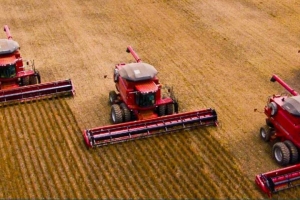


(Posted on 03/06/22)
Bunge has announced that it has exceeded its non-deforestation targets for monitoring and traceability of soybean crops from its indirect supply chain in the Brazilian Cerrado. Through the Bunge Sustainable Partnership programme, the company is now able to monitor at least 64% of indirect volumes in the priority regions, surpassing the 50% target set for 2022. In its Global Sustainability Report, the Company highlights this success which is an important achievement as company draws closer to achieving deforestation free supply chains in 2025. The Bunge Sustainable Partnership Programme is one of the many efforts that allowed Bunge to reach over 95% deforestation free soybean supply chain in the priority regions of Brazil.
“Our commitment to integrate sustainability into daily decisions we make as a company requires deep engagement with all our partners. For Bunge and the entire agriculture and food supply chains, we believe achieving real progress on non-deforestation means reaching new heights in the implementation of our approach and technology. The progress we have made in the past year is a testament to our collaborative efforts with farmers and customers and is evidence of the sustained impact we can provide,” said Greg Heckman, Bunge’s Chief Executive Officer.
The Bunge Sustainable Partnership programme, launched in 2021, was designed to help grain resellers assess suppliers’ social-environmental performance, including farm-scale satellite monitoring. Bunge was the first company to foster a large-scale effort in the Cerrado to track indirect purchases by sharing knowledge, methodologies and tools with resellers. The program is raising the standards for transparency and traceability for the indirect soy supply chain.
Bunge also launched a financial incentive mechanism, with commercial benefits for resellers as they make progress toward their suppliers’ traceability. The company will also add other incentives for participating resellers, including increased access to digital monitoring tools and data.
Bunge’s commitment to be free of deforestation and native vegetation conversion in its value chains in 2025 is a central part of the company’s business strategy and planning – and is a crucial element to its climate and emissions reduction goals. Detailed progress toward its core deforestation metrics, emissions reduction targets and other sustainability progress measures were also released today as part of Bunge’s 2022 Global Sustainability Report.
“Our business strategy is built around the growing need from our customers and partners to provide low-carbon solutions for the world. Bunge remains in a strong position to deliver as a sustainability leader and global connector for a better tomorrow,” said Rob Coviello, Bunge’s Chief Sustainability Officer and Government Affairs.
ADM and Mitsubishi Corporation have signed a non-binding memorandum of understanding to form a strategic... Read more
ESL Shipping and global steel manufacturer SSAB have agreed on a multi-year extension of the agreement... Read more
Anglo American’s Sakatti copper and polymetallic project in Finland has been designated as a &... Read more
FEFAC, representing the EU compound feed and premix manufacturers, noted with deep concern the announced... Read more
Catering to the growing demand from India’s confectionery, infant formula, and dairy sectors,... Read more
Khalifa Economic Zones Abu Dhabi – KEZAD Group, the largest operator of integrated and purpose... Read more
Rio Tinto will invest $1.8 billion1 to develop the Brockman Syncline 1 mine project (BS1), extending... Read more
Catherine Cobden, President and CEO of the Canadian Steel Producers Association (CSPA), has released... Read more
Enough domestic ferrous scrap is available for electric arc furnace (EAF) steelmakers to supply nearly... Read more
Cargill’s Ocean Transportation business and leading tanker shipping company, Hafnia, have joined... Read more